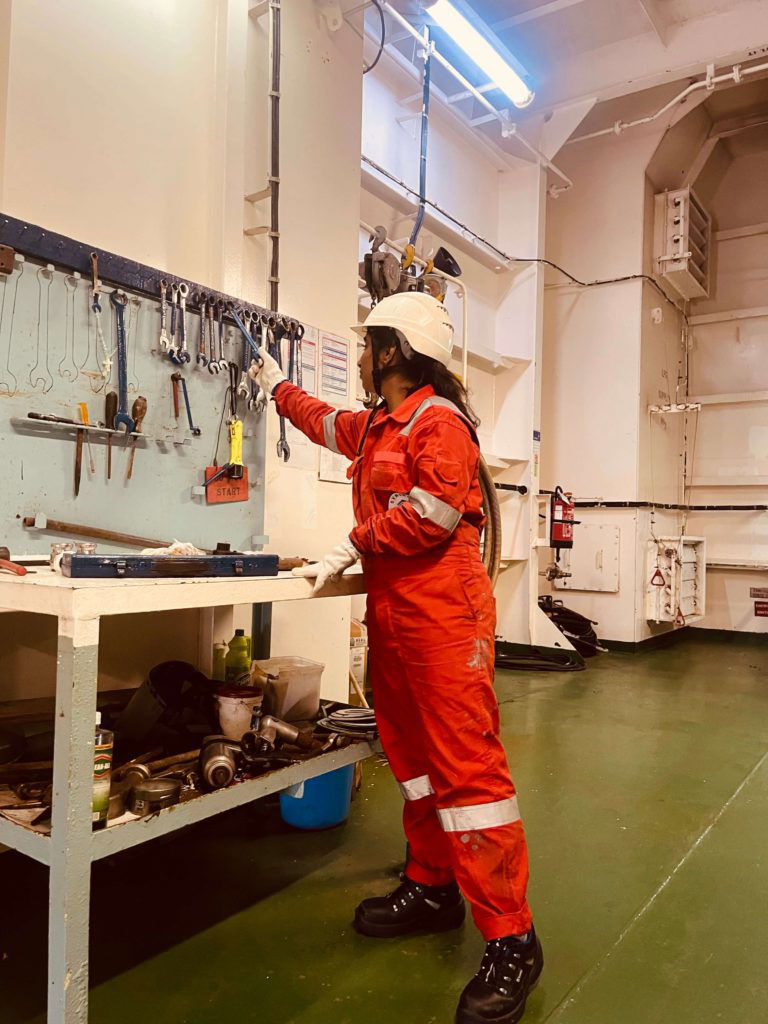1. Why did you want to sail in the merchant navy?
I thought, correctly, that such a career would give me the opportunity to travel all around the globe, and that it would stand me in excellent stead no matter how quickly the world changed. I also thought that the opportunity to work with cutting-edge technology and develop practical and technical skills would make life more enjoyable and exciting, and I am glad to say that that is happening, too.
2. Where did you complete the training for your role?
I completed my pre-sea training at SSNT, the School of Seamanship and Nautical Technology at Polambakkam, Tamil Nadu, India.
3. How did you join the Synergy Marine Group, and what has been your experience sailing with them?
I joined through their application process, with assessments and interviews, and my experience of sailing with them has been great. The Ratings Training programme is exceptional, and the wide variety of tasks that we are given is essential in order to boost self-confidence. Having this right from the start is what all Trainees dream of, and it is exactly what happens at Synergy.
4. Please describe a typical day on board.
Just as many people have said, it is a cliché but absolutely correct to say that there is no such thing, but a very rough outline might be:
Get up at 7 am and have breakfast. At 8 am the bosun (the petty officer in charge of crew and equipment) tells us all our duties for the day – as an Ordinary Seaman I mostly have deck duties – and if the ship has arrived in port I will also be involved in cargo operations. Tea break is generally at 10 am and lunch is from noon to 1 pm, and when I have completed my work, usually at 5 pm, I continue to study for my Third Officer exam and have dinner and then, later, join in with whatever entertainment is going on.
5. What are the challenges that you face in your role as an Ordinary Seaman?
We sometimes have to lift and move heavy objects, and have other tough jobs like chipping, buffing and painting. Sometimes we are working at height, too, but there is total emphasis on safety, we are always asked if we are comfortable with the task and you get used to the work. As a woman, and at first, at certain times I found it difficult to get started on a hard physical job, but people help and are considerate and I can now cope well with all situations.

6. How do you handle tasks that require physical strength and endurance, such as lifting?
At the beginning I had some difficulty with lifting heavy objects, and also when the weather was bad, but it is just a matter of getting used to things, and I am happy to say that I have now adjusted well.
7. What is the best thing about working at sea?
One of the main advantages is the opportunity to travel, as ships often sail to some of the world’s most beautiful and exotic locations, and that gives the crew the chance to explore new places and see different cultures.
8. What is the one thing that should change to make life better on board?
I think it is a question of mindset. I know it is not always possible, but things could be better if everyone was as cheerful as they could be, and went about their daily tasks without worrying about whatever the outside world might be saying or doing – or, as I sometimes put it, people on board ship need to be unique and strong.
9. Have you faced any particular challenges as a female seafarer?
Yes, when I first started, and I think that was typical of what was, and in some parts of the industry still is, an evolving situation. Men only crew has had such a long history that it will take time for everyone to get fully used to women at sea. But I quickly built confidence, just like all of us in this very new world, and was soon able to get along with everyone.
10. Female seafarers are still comparatively scarce, but things are changing for the better. Do you agree?
Yes, things are improving, and most male seafarers have now become comfortable working with female colleagues. However, for one reason because there are, still, comparatively few female seafarers, the marine sector lags behind on gender equality. Word gets around, in the wider industry, and the view among women at sea is that many are pretty much ignored.
Wherever that is happening, it needs to change, and quickly. Part of success is that all women feel that they are taken seriously, and any account of them not being is part of failure.
11. What are some of the advantages of having women on board?
Some say it makes life on board more like that on shore. That is true, but there is more to it.
Others have said this, too, but I think it is correct that women tackle problems more holistically than men, they generally show more empathy – they are certainly better at expressing, rather than masking, feelings – and they are good listeners and can offer up new angles on tackling problems.
12. What further changes do you think the maritime industry needs to make to improve gender equality and attract more women to a career in seafaring?
The main ones are establishing scholarship programmes for women, mentoring by an experienced female seafarer before joining the first vessel, always having at least two women on every vessel, so they can provide each other with support – though I appreciate that that will be difficult, certainly at this stage – arranging seminars on gender diversity and (a really basic thing, and so easy to do) providing sanitary items on board.
13. What are your aspirations, and where do you see yourself in five years?
I am working hard so as to be able to pass my Second Officer exam after completing 36 months at sea, and such that, hopefully, I can sail as a Third Officer in five years.
14. What do you do when you are ashore?
I like to see the great outdoors and sample whatever local food I find.
15. If you ever changed to a shore-based role, what would you miss most about working at sea?
I would miss the varied life on board ship, and the thrill and changes of the sea itself.
16. Share something interesting about yourself that we might not know.
In my free time I like to do drawings, and to dance.
17. What advice would you give to anyone considering a career at sea, and also to young female seafarers?
Again as others have said, to all whose dream is to go to sea, and especially women, talk first to experienced mariners and find out all about the pros and cons. Like me, hopefully you will find that though, still, across the industry, women have to work harder than men to get the same amount of credit, life at sea has more pluses than minuses.



